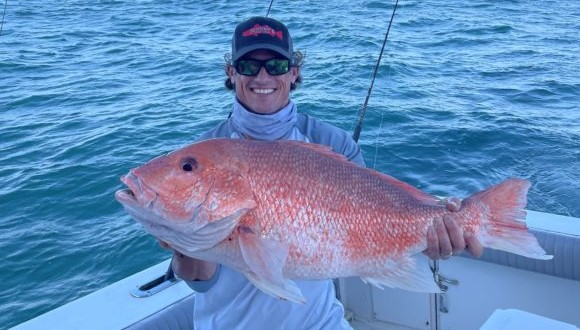
The recent announcement by Texas Parks and Wildlife Department to close the state-water red snapper season on Nov. 15 for the rest of the year is an unfortunate consequence of NOAA Fisheries continued overall oppressive control of the fishery and the dysfunctional relationship the federal agency has fostered with state fisheries managers.
___________________________________
CCA’s full statement:
Data dispute with feds closes Texas state snapper season
Federal agency downplays Snapper Count bonanza to focus on penalizing states
The recent announcement by Texas Parks and Wildlife Department to close the state-water red snapper season on Nov. 15 for the rest of the year is an unfortunate consequence of NOAA Fisheries continued overall oppressive control of the fishery and the dysfunctional relationship the federal agency has fostered with state fisheries managers.
“What should have been a simple clarification on data formulas instead turned into a protracted dispute with the State of Texas and concluded with this unfortunate and unnecessary closure,” said Ted Venker, conservation director for Coastal Conservation Association. “There were any number of ways this issue could have been settled, but NOAA has proven time and again that it is not particularly interested in working as a partner. Unfortunately, there are coastal communities and businesses in Texas that will have to pay the price of that arrogance.”
The dispute stems from a disagreement on the number of red snapper reported landed and a red snapper length-weight calculation that are used to determine how many pounds of snapper anglers have harvested in a given year. Those calculations are used to keep the state within its poundage quota of red snapper, and after analyzing Texas’s data from 2019 NOAA Fisheries decided the state’s formula was incorrect, resulting in an overage. The federal agency elected to announce in late August of 2020 that it disagreed with the state’s data by posting a notice in the Federal Register.
“A Federal Register notice on something like this is not how most people would try to foster a productive relationship to improve management of this fishery, but it is unfortunately indicative of how the federal agency interacts with the states and with recreational anglers,” said Venker.
Since the Federal Register announcement, the State of Texas and NOAA have seemingly lurched towards some sort of path forward, whereby to pay back the 62,000-pound overage that resulted from the miscalculation, the remainder of the 2021 state red snapper season will be closed.
Most frustrating of all, the overage in dispute is a tiny fraction of the massive biomass of red snapper that the recently concluded Great Red Snapper Count found in the Gulf of Mexico. The unprecedented, independent census of the red snapper population was funded directly by Congress to determine the size of the stock after decades of confusion and mismanagement by NOAA Fisheries. Led by researchers from marine science centers across the Gulf Coast, the study found more than 700 million additional pounds of red snapper biomass that federal managers had somehow overlooked. The results of the Count were peer-reviewed and accepted for management earlier this year, although NOAA Fisheries continues to dispute the impact of the new science. Anglers have yet to see the results of the Congressionally mandated study implemented in any meaningful way.
“NOAA Fisheries can overlook more than 700 million pounds of snapper in the Gulf but takes issue with a two-year-old formula calculation that produces a 62,000-pound overage in Texas,” said Venker. “This is an agency that refuses to admit it is ever wrong but expects perfection in everyone else. The closure in Texas and the ongoing situation in Alabama and Mississippi make it very clear that NOAA Fisheries will continue to insist on tying the future of red snapper to its history of mistakes, bad data, greed and politics. The only way to truly fix this fishery is give full management of the fishery to the states once and for all.”





